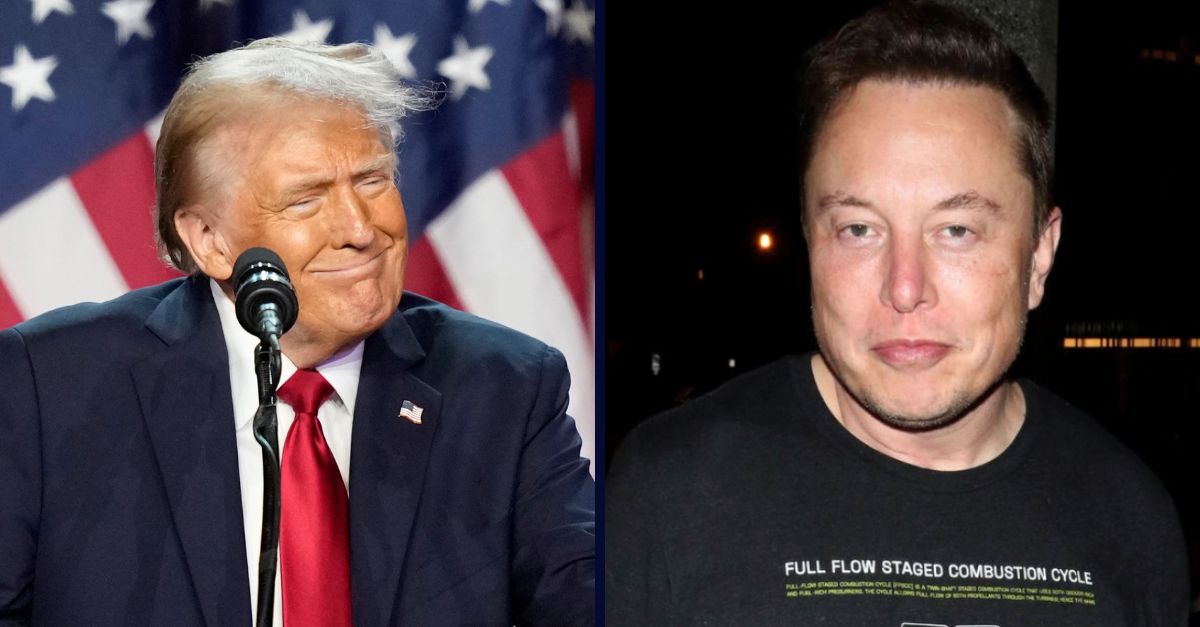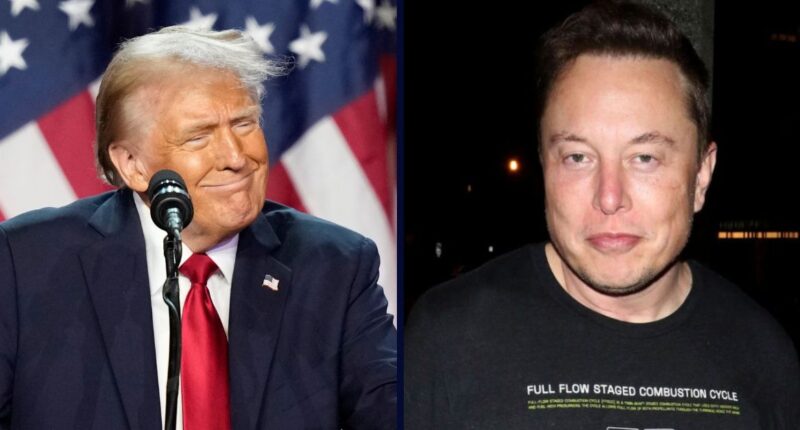
Left: President-elect Donald Trump speaks at an election night watch party, Wednesday, Nov. 6, 2024, in West Palm Beach, Fla. (AP Photo/Alex Brandon). Right: MAX/IPx 2020 9/25/20 Elon Musk is seen on September 25, 2020 in Los Angeles, California.
Facing a new lawsuit over the privacy of U.S. citizens, lawyers for the Justice Department insisted in a court hearing Wednesday afternoon that tech billionaire Elon Musk and members of the newly formed Department of Government Efficiency (DOGE) do not have “unfettered” access to the sensitive personal data and financial information of Americans after being accused by labor unions and retired workers. Hours later, President Donald Trump‘s DOJ agreed to a temporary injunction blocking Musk and DOGE’s access anyway — claiming it would maintain the status quo.
“The allegations in the complaint are about whether or not information is being improperly disclosed under the Privacy Act in Section 6103,” said Brad Humphreys, senior trial attorney for the DOJ’s Federal Programs Branch, during a virtual status hearing on Wednesday afternoon. “And our factual confirmation so far this morning has been to try to assure ourselves in the court that information is not being illegally disclosed to our knowledge.”
U.S. District Judge Colleen Kollar-Kotelly, a Bill Clinton appointee, was tasked Wednesday with weighing whether to block the Trump administration from allowing allies close to Musk and DOGE to share personal data and financial information with others after a lawsuit was filed Monday by Public Citizen Litigation Group on behalf of two labor unions and a retired workers’ advocacy group. The complaint names the U.S. Treasury Department, Treasury Secretary Scott Bessent and the Bureau of the Fiscal Service as defendants.
Two people, specifically, have been brought up in court and accused of possibly sharing information with Musk and DOGE members from Social Security and Medicare databases: Tom Krause, CEO of Cloud Software Group, and former SpaceX engineer Marko Elez. Humphreys and the DOJ claimed Wednesday that Krause and Elez have both been made “special employees” of the Treasury Department and a “firewall” prevents them from sharing info from Treasury records with DOGE members and people outside the treasury, including Musk.
During the hearing, Public Citizen attorney Nandan Joshi admitted to not having the information about Krause and Elez being “special employees” with the Treasury Department until after filing the lawsuit this week, but said that it doesn’t change the plaintiffs’ concern.
“Your Honor, when we filed the complaint, we did not have the assertion that Mr. Krause and Mr. Ellis were employees,” Joshi told Kollar-Kotelly. “That was only revealed definitively in the last 24 hours. … The plaintiffs’ claim was that they might have been outsiders who were obtaining this information. We do not know when they were actually designated special government employees either. But given the representation that they are currently governmental, it would be OK with a clean firewall between them and any outsiders to prevent any spillage or problem.”
Kollar-Kotelly replied, “OK, which is what I’m suggesting, which is the current position.”
The judge went on to say that she was interested in issuing a temporary injunction instead of a temporary restraining order, as first requested by Joshi and Public Citizens, which would give Krause and Elez “read only” access and bar them from sharing sensitive information with others. Kollar-Kotelly noted how this would be no different from the firewall being in place and would ultimately give everyone more time to prepare for the next court briefing while she weighs whether to block the pair’s access altogether, as requested in the Public Citizen suit.
“The Senate would be enjoined from giving new access … to anyone apart from Mr. Krause, Mr. Ellis, or any other current Treasury employee,” Kollar-Kotelly said. “So it would put it in a pause, so to speak. And we would obviously go forward with the briefing, but a little bit more time could be provided to the parties to be able to do it, and nothing new would happen.”
The Public Citizen suit alleges that in Bessent’s first week leading the treasury, he broke multiple laws aimed at protecting the private information of Americans from improper disclosure and misuse, particularly those laws prohibiting disclosure of the information to individuals without a “lawful and legitimate need” for it. Bessent is also accused of taking punitive measures against career employees who attempted to protect the information from being improperly accessed.
“It is disgraceful that the Trump administration has allowed unelected billionaires and their lackeys unfettered access to the personal and financial information of Americans,” said Everett Kelley, the national president for the American Federation of Government Employees, one of the plaintiffs in the case. “Together, we can stop this violation of American citizens’ privacy.”
The suit alleges that Musk and other DOGE employees had been trying to gain access to the data “for some time,” but were repeatedly rebuffed by an unnamed civil servant who was then the head of the Bureau of the Fiscal Service. One of Bessent’s first acts as treasury secretary, according to the complaint, was to place that civil servant on leave and “grant DOGE-affiliated individuals full access to the Bureau’s data and the computer systems that house them.” The career public servant was David Lebryk, who retired on Friday after being placed on administrative leave, according to a report from The New York Times.
More from Law&Crime: ‘Directly violates the law’: Trump defying ’90 years of Supreme Court precedent’ in firing labor board member after ‘unlawful’ termination, lawsuit says
Trump has not announced a DOGE administrator or revealed publicly whether Must is a government employee or if he remains a private citizen.
According to the order:
[T]he defendants will not provide access to any payment record or payment system of records maintained by or within the Bureau of the Fiscal Service, except that the defendants may provide access to any of the following people: Mr. Tom Krause, a Special Government Employee in the Department of the Treasury, as needed for the performance of his duties, provided that such access to payment records will be ‘read only’; Mr. Marko Elez, a Special Government Employee in the Department of the Treasury, as needed for the performance of his duties, provided that such access to payment records will be “read only;” and “any person who is an employee (but not a Special Government Employee) of the Department of the Treasury and who has a need for the record or system of records in the performance of their duties.









